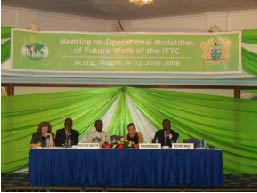Grants worth over US$2 million to assist sustainable forest management in Africa were announced at a meeting of the International Tropical Timber Organization (ITTO) underway here this week.
ITTO is an intergovernmental organization with 60 members (including 10 in West and Central Africa) that develops and implements policies for sustainable tropical forest management and promotes the international trade of tropical timber. Since 1987 the Organization has provided grants worth over US$300 million to fund over 600 projects designed to promote sustainable forest management, conservation and sustainable development.
A major issue facing ITTO is the entry into force of a new governing treaty, the International Tropical Timber Agreement, 2006 (ITTA 2006). The meeting in Accra, called for in a 2007 decision of the International Tropical Timber Council (ITTO’s governing body), is reviewing and clarifying the operational issues to be considered on the entry into force of the new agreement. These issues include the modalities of operation of new thematic programs that will guide the Organization’s work (and are expected to lead to new sources of funding), as well as the functions of the Council’s subsidiary committees established by the ITTA 2006 and the cycle for submission, review and funding of projects. Elements for draft decisions on these topics were drafted by working groups established during the meeting and will serve as the basis of discussions at the next Council Session in Yokohama this November.
The Accra meeting began with a one-day conference for ITTO African member countries (“Africa Day”) focusing on regional challenges and identifying specific regional issues and development assistance needs in the context of ITTO. Ministers responsible for forestry from Cameroon, Congo and Ghana presented the forest situation in their countries, focusing on the issues of poverty, climate change and sustainable development, with all identifying the forest sector as a key element in addressing these challenges. All three ministers also recognized the important role of ITTO and other development partners in assisting the transition to sustainable forest management underway in their countries. Other Africa Day speakers included representatives from the World Bank, the World Conservation Union (IUCN), the Central African Forestry Commission (COMIFAC) and the International Forest Industries Association (IFIA). Several of the themes of Africa Day (particularly those on community involvement and the role of small-scale enterprises) received additional emphasis a day later in a side event on Community Based Forest Management and Enterprises organized by ITTO's Civil Society Advisory Group.
Funding pledged by ITTO donors during the six month project cycle leading up to the Accra meeting totaled over US$3 million and included support for two Ghanaian projects (one to assist forest communities to conserve and sustainably utilize medicinal plants and another to implement a timber tracking system). Other African projects for which support was pledged included a proposal from Côte d’Ivoire to manage and conserve forest seed sources, a study on conservation and sustainable biodiversity management in Togo and a partially funded proposal to strengthen sustainable forest management training through RIFFEAC, a network of Central African forestry and environmental training institutions. A joint ITTO-FAO regional workshop to improve forest law compliance in West Africa was also funded, together with another 2008-09 Work Program activity to update an ITTO-FAO compendium of best practices for improving forest law compliance based on the outcome of a series of regional workshops that will culminate with the workshop for West Africa. Other regions also received support, including for a project to strengthen forest law enforcement and governance in Cambodia, for another to add value to commercial timbers produced by community sawmills in Guyana and for a proposal to strengthen Thailand’s national forest information system. Additional funds were also pledged to allow ITTO to continue offering fellowships to deserving nationals of its member countries during 2008. Donors pledging funds during this project cycle were Japan, the USA, Switzerland, the Netherlands, Belgium, New Zealand, Australia, Finland and Korea.
For more information on the Accra meeting, ITTO and/or the projects it supports, visit www.itto.or.jp.
Meeting on Forests to Benefit Africa
11 June 2008, Accra, Ghana

Chairperson Katharina Kuehmayer
addresses the meeting
Photo: ITTO